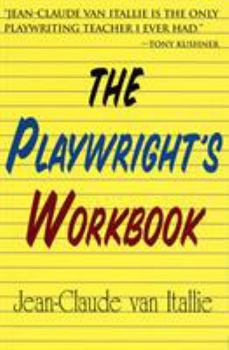The Playwright's Workbook
Select Format
Select Condition 
Book Overview
A series of 13 written workshops covering: conflict and character: the dominant image: Tennessee Williams and Arthur Miller - Overheard voices: Ibsen and Shakespeare - The solo performance piece: listening for stories - Terror and vulnerability: Ionesco - The point of absurdity: creating without possessing: Pinter and Beckett - and much more.
Format:Paperback
Language:English
ISBN:1557833028
ISBN13:9781557833020
Release Date:May 2000
Publisher:Globe Pequot Publishing Group Inc/Bloomsbury
Length:142 Pages
Weight:0.54 lbs.
Dimensions:0.5" x 6.0" x 9.0"
Customer Reviews
3 ratings
Dynamic Resource for Learning Play Writing
Published by Thriftbooks.com User , 15 years ago
The Playwright's Workbook is an unexpected and valuable resource for writers to work in a group and share their work. Jean-Claude is an amazing teacher. He lays down the basic premises early on: 1. Listen to conversations in the real world, then write it and read it to other writers. 2. Write without thinking, dare to be stupid. Then he takes you step by step in showing you how to structure what you're doing in building characters and writing scenes. In the beginning, the first reaction is, "This is too easy." No way. To begin with, listening to the voices around you is not something you normally do, and remembering what you hear isn't easy. He lets you experience the excitement of creating unique characters, showing you the how to create "Where" "What" and "When" as well as "Who," and how each dimension makes all the difference in the world to the final outcome. The writing group I formed is in its final, thirteenth week, having done all the exercises. My personal experience is that even before the end, I'm working on two plays, one of which seeems to have a life of its one. I never thought I could write farce, but there it is on the page, coming to life and I'm having fun. A few suggestions: You can use this book by yourself, but you must be disciplined to do the exercises chapter by chapter. Take the time you need, but follow Jean-Claude's instructions as closely as you can. If you have a normal life and you're working as a group, after the first few meetings schedule every two weeks. You may find yourself spending hours on an exercise, not because you have to, but because you want to. Lastly, read as many plays that are suggested as assignments as you can. You probably will hate some and love others, but the great writers all have something to teach. The excitement is that you see how they did it because you understand the process yourself.
Best book I've found for the beginner
Published by Thriftbooks.com User , 24 years ago
I've been wrestling with playwriting for more than a decade. The last book I used was Playwriting in Process, which is excellent, but the exercises are too advanced for me. "Write a scene in which two people have a secret but no one talks about it," for example. If I knew how to write a scene I wouldn't need to do exercises!The Playwright's Workbook, on the other hand, deals in the very basics. Van Itallie explains how each scene needs a "who," "what," and a "where." His writing voice is notable for its simplicity and warmth. For the first time in my life I'm getting the sense that I can actually write plays.
Great Auther
Published by Thriftbooks.com User , 24 years ago
Jean Claude Van Itallie is a great playwright, hes been making good stuff for many many years. In theatre class I have had the privliage to preform many of his pieces and they are very humerous. Any who, if you like to write plays then get this book, he tells about how he does it.






